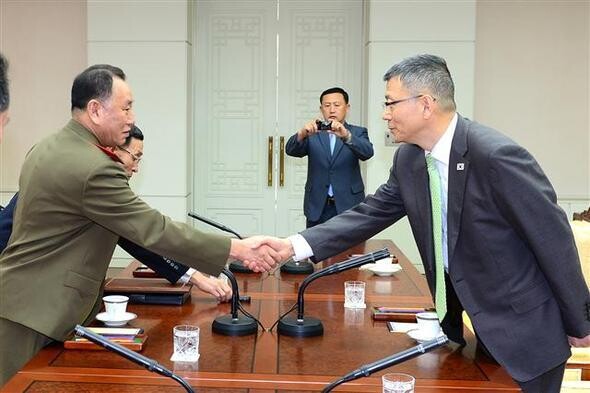hankyoreh
Links to other country sites 다른 나라 사이트 링크
[Reporter’s notebook] Park gov’t breaks its own principle of transparency

By Choi Hyun-june, staff reporter
On Oct. 15, delegations from the North Korean and South Korean militaries sat down for talks at Panmunjeom Peace Village for the first time in 44 months. While this is a welcome development, the meeting concluded without results, with the two sides only confirming their differences.
But the South Korean government concealed the meeting from beginning to end. Reports that a meeting would take place began to emerge in the morning, and the meeting itself started at 10 am, but government spokespeople only repeated that they could not confirm anything.
The Blue House passed the buck by asking reporters to check with the Defense Ministry. During the daily briefing, the spokesperson for the Unification Ministry - the government body responsible for inter-Korean relations - said around 20 times that she was sorry she couldn’t confirm the meeting.
It was not until 4 pm, after the meeting had concluded, that the Defense Ministry acknowledged that officials from South and North had met. This attitude could not be further from the principle of “transparent contact with North Korea” espoused by the administration of President Park Geun-hye.
Taking issue with the closed-door and secret meetings that took place under the previous administration, the Park administration has held to the principle that transparency should be maintained in meetings with North Korea.
There have been plenty of objections to this approach, including the argument that the special nature of inter-Korean relations means that transparency is not always the best approach. Critics say that a flexible approach is needed, considering not only the conflict between conservatives and progressives in South Korea, but also relations with the US and China.
Despite this, the Park administration has stuck to its guns on transparency. When North Korea requested that the first round of high-level talks that took place in February be held behind closed doors, the South Korean government asked for an open-door meeting, and North Korea complied.
But during the most recent meeting with North Korea, the Park administration violated its own principle of transparency. The official reason provided was that the North had asked for a closed-door meeting, but government behavior was completely different from what was seen during the first-round of high-level talks in February.
Other opinions are being voiced inside the Unification Ministry. Sources suggest that the government intended to decide whether to disclose the meeting at all depending on how it turned out.
Indeed, the issues of the launches of balloons filled with propaganda leaflets and the Northern Limit Line (NLL) in the West (Yellow) Sea were dealt with during the meeting. North Korea could have linked these issues with the second round of high-level talks already planned to be held around the end of October, putting the South Korean government on the defensive. The argument is that the South Korean government agreed to hold the talks behind closed doors because of these concerns.
A Unification Ministry official also suggested that the government was planning to decide whether to public disclose the meeting depending on its outcome.
If a principle is flawed, it should be replaced. We cannot always insist on transparency in relations with North Korea.
Nevertheless, the government should not act in this fashion. Refusing to confirm a meeting for eight or nine hours after news has already broken about it does not make it a secret. This is a slap in the face of the media, and of the Korean people.
Please direct questions or comments to [english@hani.co.kr]

Editorial・opinion
![[Column] Season 2 of special prosecutor probe may be coming to Korea soon [Column] Season 2 of special prosecutor probe may be coming to Korea soon](https://flexible.img.hani.co.kr/flexible/normal/500/300/imgdb/original/2024/0426/3317141030699447.jpg) [Column] Season 2 of special prosecutor probe may be coming to Korea soon
[Column] Season 2 of special prosecutor probe may be coming to Korea soon![[Column] Park Geun-hye déjà vu in Yoon Suk-yeol [Column] Park Geun-hye déjà vu in Yoon Suk-yeol](https://flexible.img.hani.co.kr/flexible/normal/500/300/imgdb/original/2024/0424/651713945113788.jpg) [Column] Park Geun-hye déjà vu in Yoon Suk-yeol
[Column] Park Geun-hye déjà vu in Yoon Suk-yeol- [Editorial] New weight of N. Korea’s nuclear threats makes dialogue all the more urgent
- [Guest essay] The real reason Korea’s new right wants to dub Rhee a founding father
- [Column] ‘Choson’: Is it time we start referring to N. Korea in its own terms?
- [Editorial] Japan’s rewriting of history with Korea has gone too far
- [Column] The president’s questionable capacity for dialogue
- [Column] Are chaebol firms just pizza pies for families to divvy up as they please?
- [Column] Has Korea, too, crossed the Rubicon on China?
- [Correspondent’s column] In Japan’s alliance with US, echoes of its past alliances with UK
Most viewed articles
- 1‘We must say no’: Seoul defense chief on Korean, USFK involvement in hypothetical Taiwan crisis
- 2N. Korean delegation’s trip to Iran shows how Pyongyang is leveraging ties with Moscow
- 3‘Weddingflation’ breaks the bank for Korean couples-to-be
- 4Korea sees more deaths than births for 52nd consecutive month in February
- 5[Editorial] New weight of N. Korea’s nuclear threats makes dialogue all the more urgent
- 6[Column] Park Geun-hye déjà vu in Yoon Suk-yeol
- 7[Column] Has Korea, too, crossed the Rubicon on China?
- 8[Guest essay] The real reason Korea’s new right wants to dub Rhee a founding father
- 9Will NewJeans end up collateral damage in internal feud at K-pop juggernaut Hybe?
- 10Why Korea shouldn’t welcome Japan’s newly beefed up defense cooperation with US